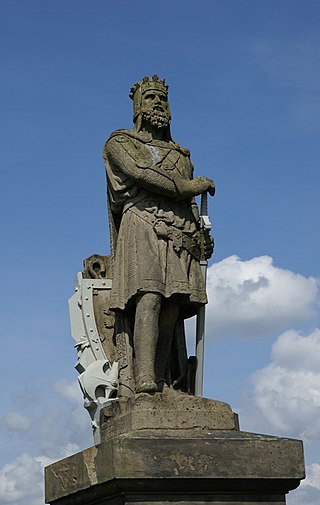See also
- Adalbert, a given name
- Adalberto, a given name
- Aldebert (disambiguation)
| Gender | Male |
|---|---|
| Language(s) | German |
| Origin | |
| Meaning | noble bright |
| Other names | |
| See also | Albert, Adalbert, Delbert |
Adelbert is a given name of German origin, which means "noble bright" or "noble shining", derived from the words adal (meaning noble) and berht (shining or bright). Alternative spellings include Adalbart and Adalberto. Related names include Albert, Delbert, and Elbert. The name Adelbert may refer to:
John Brown most often refers to:
Egbert is a name that derives from old Germanic words meaning "bright edge", such as that of a blade. Anglo-Saxon variant spellings include Ecgberht and Ecgbert. German variant spellings include Eckbert and Ekbert.
Adalbert is a German given name which means "noble bright" or "noble shining", derived from the words adal and berht. Alternative spellings include Adelbart, Adelbert and Adalberto. Derivative names include Albert and Elbert.

Albrecht is a given name or surname of German origin and may refer to:

Adolf is a given name with German origins.
James Campbell may refer to:

The name Robert is an ancient Germanic given name, from Proto-Germanic *Hrōþi- "fame" and *berhta- "bright" (Hrōþiberhtaz). Compare Old Dutch Robrecht and Old High German Hrodebert. It is the second most frequently used given name of ancient Germanic origin. It is also in use as a surname. Another commonly used form of the name is Rupert.
Herbert is a Germanic given name, from harja- "army", "warrior" or "noble, sublime", and beraht "bright" or "shining". See also Heribert and Aribert, other given names with the same roots.
The surname Keith has several origins. In some cases it is derived from Keith in East Lothian, Scotland. In other cases the surname is originated from a nickname, derived from the Middle High German kīt, a word meaning "sprout", "offspring", which is further finding its roots in Samskrutham aka Sanskrit, which means field or farm.
O'Malley is an Irish surname. According to historian C. Thomas Cairney, the O'Malleys were the chiefly family of the Partraige who were a tribe of the Erainn, the second wave of Celts to settle in Ireland between about 500 and 100 BC.
The surname Ames is usually either French, English or German in origin. The French name comes from the noun amie, meaning a friend or a beloved. The surname also derives from the Old French and Middle English personal name Amys or Amice, the Latin amicus, or from a Late Latin derivative of this, Amicius. The German roots of the name could have come from the Old High German word amazzig, meaning "busy," as a nickname for an active person. The name also has connections to the modern German name Ameise, meaning "ant".
Brownlow is a surname. Notable people with the surname include:

Arnold is a masculine German, Dutch and English given name. It is composed of the Germanic elements arn "eagle" and wald "power, brightness". The name was first recorded in Francia from about the 7th century, at first often conflated with the name Arnulf, as in the name of bishop Arnulf of Metz, also recorded as Arnoald. Arnulf appears to be the older name, and German (Frankish) Arnold may have originally arisen in c. the 7th century as a corruption of Arnulf, possibly by conflation of similar names such as Hari-wald, Arn-hald, etc.
Christie is a surname of Scottish origin.
August is both a given name and surname developed from the Latin, Augustus. Derived from the Latin word augere, meaning "to increase", Augustus had the meaning "esteemed" or "venerable" and was a title given to Roman emperors.
Linden is a surname commonly of Dutch, English and German origin. For the Swedish surname, see Lindén.

Albert is a masculine given name. It is derived from the Germanic Adalbert and Adelbert, containing the words adal ("noble") and beraht. It is also less commonly in use as a surname. Feminine forms of the names "Alberta" are declining in use.
Abraham is a surname. It can be of Jewish, English, French, German, Dutch, Irish, Welsh, Cornish, Breton, Lebanese, Syrian and other origins. It is derived from the Hebrew personal name Avraham, borne by the biblical patriarch Abraham, revered by Jews as a founding father of the Jewish people, and by Muslims as founder of all Semitic peoples. The name is explained in Genesis 17:5 as being derived from the Hebrew av hamon goyim "father of a multitude of nations". It was commonly used as a given name among Christians in the Middle Ages, and has always been a popular Jewish given name. The English name Abram is often a short form of Abraham, but it can also be a shortened version of Adburgham, which comes from a place name. As an Irish name, it was adopted as an approximation of the Gaelic name Mac an Bhreitheamhan "son of the judge". The German name Brahm is often a short form of Abraham, but it can also be a topographic name signifying someone who lived near a bramble thicket. The name Braham has been used as an Anglicization of both Abraham and its patronymic Abrahams by Ashkenazi Jews in the British Isles. Abraham has also been used as an Anglicization of the equivalent Arabic surname Ibrāhīm. It is also found as a given name among Christians in India, and has come to be used as a family name among families from Kerala.
Delbert is a given name. It is a short form of Adelbert, which is a combination of the German words adal, meaning noble, and berht, meaning bright. Notable people with the name include:
Adalberto is the Romance version of the Latinized form (Albertus) of Germanic Adalbert. It is used in Italian, Portuguese and Spanish. It derives from the Old German Athala and Berth. Notable people with the name include: